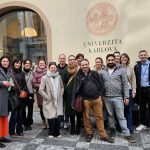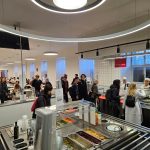- © DSW, S.Engel
The study visit, organized in collaboration with the European Council for Student Affairs (ECStA), Charles University, and the DSW, took place in Prague from March 18–20, 2024.
The aim of the study visit was to exchange experiences and work together to develop solutions to existing challenges in designing a plant-based food offering.
Vegan and vegetarian options in university dining services in Europe is a trend, but it also places special demands on employees and requires further measures such as extended recipe development, changes in food purchasing, targeted further training for university dining services staff and new food offerings in the snack area.
In light of the sharp rise in the number of international students, Charles University in Prague – one of the oldest universities in Europe – has introduced a vegan menu in all university restaurants and cafeterias on all working days since September 2023. In Germany and other countries, too, vegan and vegetarian options have been firmly established in the menu for some time, but there is often a lack of exchange of experience between specialists across national borders.
Contents of the Study Trip:
Student Services at Charles-University Prague
Development of Vegan Meals in Dining Services in Europe
- Sustainable food systems at Charles University: Vegan and vegetarian food services, Charles University Prague
- Plant-based food trends in student restauration – Experiences from Germany, DSW
- Experiences in vegan and vegetarian dining services – Examples from Italy, ANDISU
Campus tour of Charles University Prague (focus on student dining halls)
Exchange by members of the group on the following key themes:
How to develop tasty vegan and vegetarian meals and build up a database of recipes
Challenges in staff training: how to motivate kitchen teams for new ways of cooking?
Challenges in product purchasing: how to acquire the necessary (and sometimes rare) ingredients?
Communication and marketing efforts around new offers: how to win the customers?
Incorporating research and empirical data into dining services: use of available data (e.g. on allergens, energy consumption etc.) and cooperation with universities and research institutes.
- Increasing the uptake of vegan meals, ProVeg Czech Republic
- Vegan cooking and the associated challenge of getting employees excited about it, STW Heidelberg
- Vegetarian and vegan catering in the student restaurants of Ghent University, Ghent University
- Using Data on carbon footprint and climate score in dining services – the Eaternity project, STW Ulm





